The objective of this blog post is to delve into the realm of R Series Mind Rubrics (alongside their interpretations) derived from Kent’s Repertory.
This exploration will focus on their psychological implications and the remedies they propose.
Kent’s Repertory holds a vital position in the field of homeopathy, unravelling the complex interplay between emotional states and physical symptoms.
By grasping the profound emotional connotations embedded within these rubrics, individuals can skilfully traverse the landscape of homeopathy.
This understanding enables practitioners to precisely identify and administer the most fitting remedies, aligning with the unique mental and emotional conditions of each individual.
Table of Contents
ToggleRAGE/FURY/FRANTIC/FRENZY
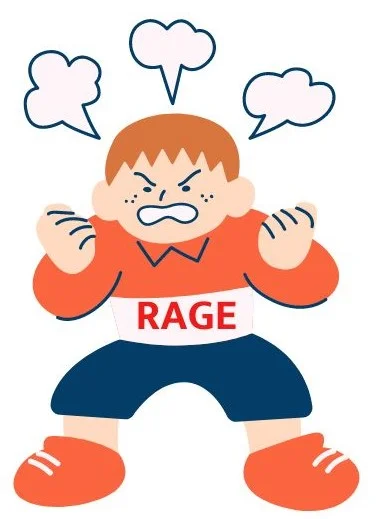
- “RAGE” refers to a very strong and uncontrollable anger. It’s like a fire of fury burning inside you.
- “FURY” is similar to rage but often even more intense. It’s like a storm of anger, making you feel out of control.
- “FRANTIC” describes a state of panic or extreme anxiety. It’s when you’re rushing around chaotically, feeling overwhelmed.
- “FRENZY” is like a burst of wild excitement or activity. It’s when things become chaotic due to high energy or strong emotions.
In simpler words:
- “RAGE” is intense anger.
- “FURY” is like rage but even more intense.
- “FRANTIC” is panicked chaos.
- “FRENZY” is wild excitement leading to chaos.
Remedies: Agar., Bell., Canth., Hyos., Mosch.
RASHNESS
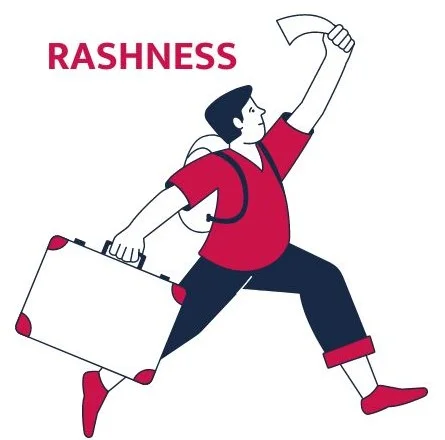
Rashness means acting without thinking or making hasty decisions without considering the consequences.
It’s like doing something quickly and impulsively without taking the time to consider if it’s a good idea or not.
Rashness often leads to mistakes or problems because it lacks careful planning or consideration.
Remedies: Aur., caps., puls.
READING, aversion to
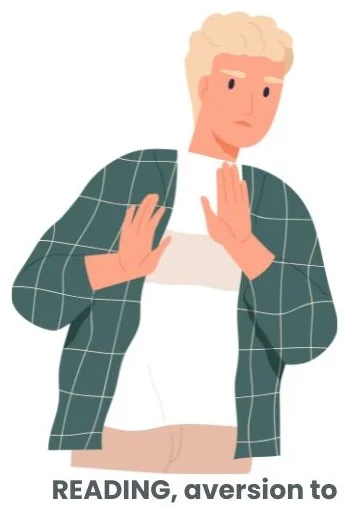
- “READING” refers to the activity of looking at written words to understand their meaning.
- It involves interpreting text and comprehending the information presented.
- People read to gain knowledge, entertainment, or information.
- “Aversion to” indicates a strong dislike or avoidance of something.
- When someone has an “aversion to READING,” it means they have a strong dislike or reluctance towards reading.
- This could stem from various reasons, such as finding it uninteresting or challenging.
- “Aversion to READING” might lead to avoiding books, articles, or written materials.
- It could limit exposure to valuable information and learning opportunities.
- Overcoming this aversion might involve finding engaging or relatable reading material.
“Aversion to READING” signifies a strong negative feeling towards reading activities, potentially hindering opportunities for knowledge and enjoyment.
Remedies: Acon., carl., nux-v., sil.
RECOGNIZE, does not his relatives
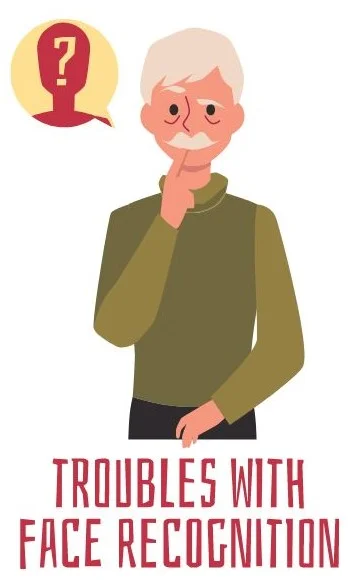
- “RECOGNIZE” means to identify, acknowledge, or be familiar with someone or something.
- It involves realizing who or what a person or thing is based on previous knowledge or characteristics.
- “Does not” indicates a negative action or absence of a specific behaviour.
- “His relatives” refers to family members or people related by blood.
- When someone “does not RECOGNIZE his relatives,” it means they are unable to identify or acknowledge their own family members.
- This could be due to various reasons, such as memory loss or unfamiliarity.
- “Does not RECOGNIZE his relatives” might lead to confusion or strained relationships.
- It could indicate a lack of connection or familiarity with close family members.
“Does not RECOGNIZE his relatives” signifies an inability to identify or acknowledge family members, potentially impacting interpersonal relationships and connections.
Remedies: Bell., Hyos.
REFUSES, to take the medicine
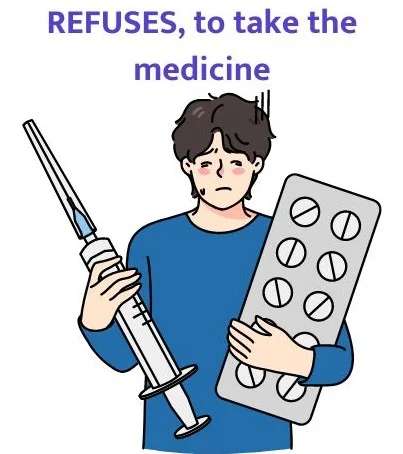
- “REFUSES” means to decline or reject something, often due to a personal decision.
- In this context, it implies a person’s active choice not to do a particular action.
- “TO TAKE” indicates the action of ingesting or consuming something.
- “THE MEDICINE” refers to a prescribed substance used to treat or prevent illness.
- “REFUSES to take the medicine” suggests that the person is choosing not to consume the prescribed treatment.
- This decision might be influenced by factors such as taste, fear, belief, or side effects.
- It could impact the effectiveness of the treatment or the person’s health.
- “REFUSES to take the medicine” emphasizes the individual’s autonomy in making health-related choices.
- It’s important to consider the reasons behind refusal and seek medical advice if needed.
Overall, “REFUSES to take the medicine” indicates a deliberate decision to avoid ingesting a prescribed remedy.
Remedy: Hyos.
RELIGIOUS affections
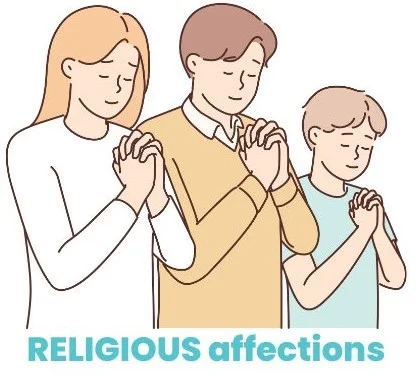
- “RELIGIOUS” relates to matters of faith, spirituality, and belief in a higher power.
- It involves practices, rituals, and values associated with a particular religion.
- “AFFECTIONS” refer to emotional states, feelings, or sentiments.
- “RELIGIOUS affections” combine these terms, signifying emotional experiences or sentiments related to one’s faith.
- It describes the deep emotional connections people have with their religious beliefs.
- These feelings could include love, devotion, reverence, or awe towards spiritual concepts.
- “RELIGIOUS affections” reflect the emotional aspect of a person’s religious life.
- They can influence actions, decisions, and interactions within a religious context.
- Nurturing positive “RELIGIOUS affections” can enhance one’s spiritual journey.
Overall, “RELIGIOUS affections” represent the emotional aspects of a person’s connection to their faith and spiritual beliefs.
Remedies: Lach., Lil-t., Sulph., Verat., Zinc.
REMORSE
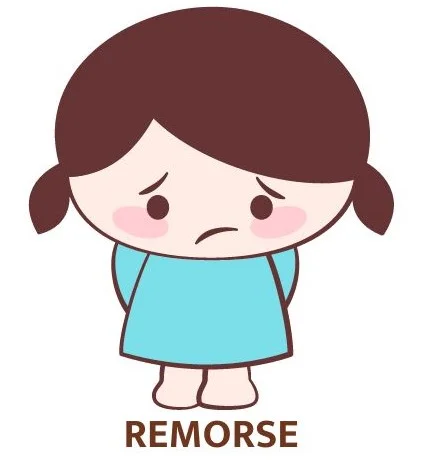
- “REMORSE” is a powerful feeling of sorrow and regret.
- It arises when someone realizes they’ve done something wrong or hurtful.
- These feeling stems from understanding the negative impact of their actions.
- “REMORSE” involves a sense of responsibility for the harm caused.
- It often leads to a sincere desire to make things right or seek forgiveness.
- This emotion can be triggered by breaking promises, hurting others, or acting against personal values.
- “REMORSE” shows a moral compass and empathy for others’ feelings.
- It encourages genuine apologies and efforts to repair relationships.
- Experiencing “REMORSE” indicates a willingness to learn from mistakes.
In summary, “REMORSE” is the heartfelt regret for one’s actions and a drive to make amends.
Remedies: Coff., ars., cupr., puls., verat.
REPROACHES, ailments after
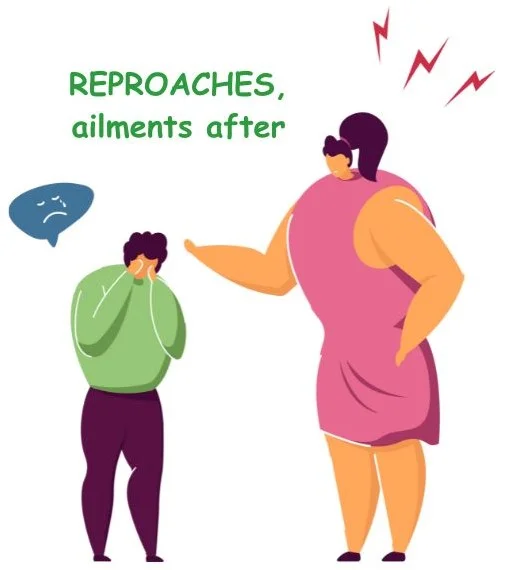
- “REPROACHES” refer to expressions of disapproval, blame, or criticism directed towards someone.
- It involves highlighting perceived faults, mistakes, or wrongdoings of that person.
- “AILMENTS” denote physical or emotional health issues or conditions.
- “Ailments after REPROACHES” combines these terms, suggesting health problems occurring following negative criticism or blame.
- This phrase implies a potential connection between emotional stress, like reproaches, and subsequent physical or mental health issues.
- Stress from reproachful situations might contribute to the onset or worsening of ailments.
- “Ailments after REPROACHES” indicates the mind-body connection and the potential impact of emotional distress on health.
- It’s a reminder of the complex interplay between emotions and physical well-being.
In summary, “Ailments after REPROACHES” suggests a possible link between negative criticism and subsequent health problems.
Remedies: Op., staph.
REPULSIVE MOOD/LOW-MINDED

Both these words refer to a negative emotional state combined with unrefined or negative thinking patterns:
- “REPULSIVE” describes a strong feeling of aversion or disgust towards something.
- “MOOD” refers to an individual’s emotional state or feeling at a particular time.
- “REPULSIVE MOOD” suggests experiencing intense dislike or disgust, impacting one’s emotional well-being.
Now, the difference between “REPULSIVE MOOD” and “LOW-MINDED”:
- “LOW-MINDED” characterizes having crude, base, or negative thoughts.
- It indicates a lack of moral or intellectual elevation in one’s thinking.
- “LOW-MINDED” relates to the quality of thoughts and mindset.
In summary:
“REPULSIVE MOOD” focuses on emotions of aversion, “LOW-MINDED” emphasizes the quality of thinking.
Remedies: Hep., merc., puls.
RESERVED
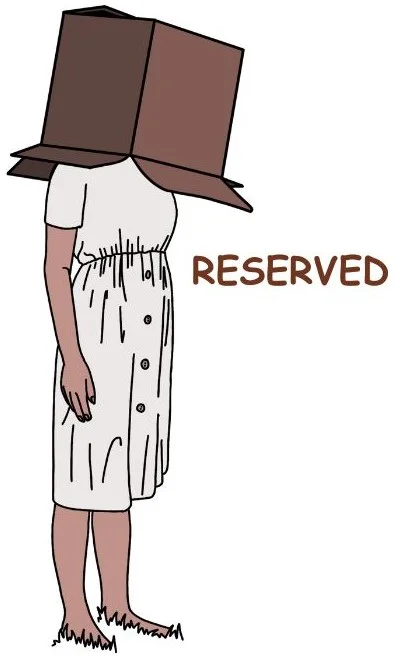
- “RESERVED” describes a personality trait where someone is quiet and restrained in expressing themselves.
- It implies a tendency to hold back emotions, thoughts, or opinions.
- People who are “RESERVED” often appear calm and composed in social interactions.
- They may take time to open up and share their feelings or ideas.
- “RESERVED” individuals are careful with their words and prefer listening over speaking.
- This trait can reflect a sense of privacy and a desire to maintain personal boundaries.
- “RESERVED” behaviour might be mistaken for shyness, but it’s more about being discreet.
- It can also stem from cultural or upbringing influences.
Remedies: Calc., hell., ign., stann.
REST cannot, when things are not in proper place
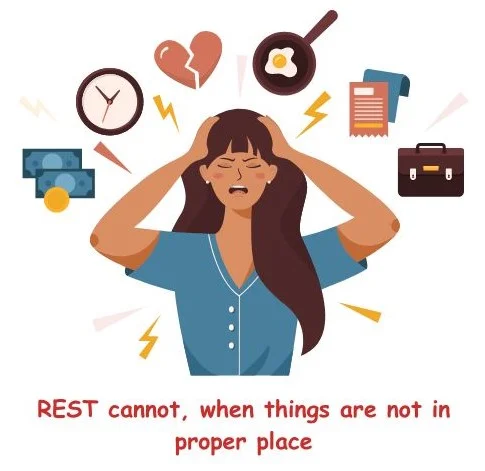
- “REST” refers to a state of relaxation, calmness, or tranquillity.
- It suggests a break from activity or a peaceful state of being.
- “CANNOT” indicates an inability or lack of capability to do something.
- “When things are not in proper place” implies that the environment or circumstances are disorganized or chaotic.
- This phrase conveys that true restfulness is challenging to achieve when there is disorder or imbalance.
- It suggests that external factors, such as a messy environment or unresolved issues, can disrupt a sense of calm.
- The phrase highlights the connection between a harmonious environment and the ability to experience genuine rest.
- It indicates the importance of order and balance for achieving true relaxation.
- Overall, the phrase suggests that a state of rest is hard to attain when the surroundings are in disarray or not properly arranged.
Remedies: Anac., ars.
RESTLESSNESS/FIDGETY/NERVOUSNESS
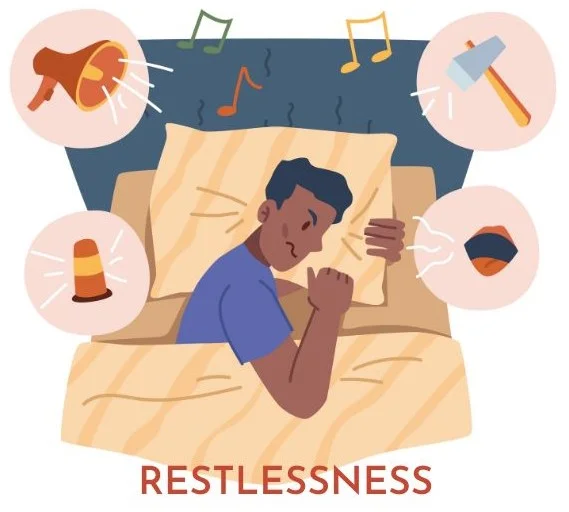
RESTLESSNESS: Restlessness refers to a state of agitation, unease, or the inability to stay still or calm. A restless person may feel a constant need for movement or change, often due to inner discomfort or anxiety.
FIDGETY: Being fidgety means displaying nervous movements or restlessness, often involving small, repetitive actions like tapping fingers or shifting positions. It’s a physical manifestation of inner unease or nervousness.
NERVOUSNESS: Nervousness is a state of anxiety or worry, often accompanied by a sense of unease or apprehension. It can lead to restlessness and fidgetiness, as well as other physical symptoms like sweaty palms or a racing heart.
Differences
- Restlessness is a broader term describing a state of constant unease or lack of calmness. It doesn’t necessarily involve specific physical actions.
- Fidgety specifically refers to the physical restlessness and nervous movements, like tapping, fiddling, or squirming, that often accompany inner tension.
- Nervousness is an emotional state of worry or anxiety. It can lead to restlessness and fidgetiness but is more focused on the mental and emotional aspect.
In summary, restlessness is the general feeling of unease, fidgety is the physical restlessness and movements, and nervousness is the emotional state of anxiety.
Remedies: Acon., Bell., Camph., Hyos., Rhus-t., Tarent.
REVEALS secrets

- “REVEALS” means to make something known or disclose information.
- “Secrets” are hidden or confidential pieces of information not meant for everyone to know.
- When someone “REVEALS secrets,” they share private or undisclosed details with others.
- This can involve disclosing personal, sensitive, or confidential information.
- “REVEALS secrets” can relate to revealing truths, intentions, or facts that were previously concealed.
- It often involves sharing information that others might not be aware of.
- People might “REVEAL secrets” intentionally or unintentionally, affecting trust and relationships.
- The act of “REVEALING secrets” can have various consequences, both positive and negative.
- It’s essential to consider the impact of sharing secrets and respect others’ privacy.
Overall, “REVEALS secrets” refers to the action of disclosing hidden or confidential information to others.
Remedies: Agar., hyos.
REVERENCE for those around him

- “REVERENCE” is a deep feeling of respect, admiration, and honor towards someone or something.
- It involves holding someone or something in high esteem and treating them with utmost regard.
- “For those around him” means showing this profound respect to the people in one’s vicinity or social circle.
- When someone has “REVERENCE for those around him,” they treat others with kindness, consideration, and humility.
- This includes valuing others’ opinions, feelings, and well-being.
- “REVERENCE for those around him” signifies a genuine care and appreciation for the people in one’s life.
- It involves creating a positive and harmonious environment by recognizing others’ worth.
- People with “REVERENCE for those around him” uplift and support others, fostering meaningful relationships.
- This attitude promotes empathy, understanding, and a sense of community.
Overall, “REVERENCE for those around him” means having deep respect and admiration for the people in one’s presence, leading to positive interactions and connections.
Remedies: Anac., coloc.
RIDICULE, mania to
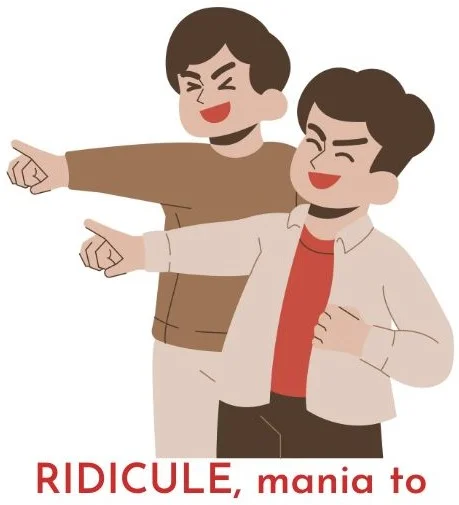
- “RIDICULE” refers to making fun of or mocking someone or something, often in a hurtful or scornful manner.
- It involves using sarcasm, jokes, or criticism to belittle or demean others.
- “Mania to” suggests an intense and uncontrollable desire or compulsion.
- When someone has a “mania to” engage in ridicule, it means they have a strong and obsessive urge to mock or ridicule others.
- This could be driven by a need to feel superior or to gain attention.
- “RIDICULE, mania to” signifies an unhealthy and excessive fixation on mocking others, which can be hurtful and damaging.
- It may indicate underlying insecurities or a lack of empathy towards others’ feelings.
- People with this tendency may engage in constant mocking behaviour without considering the consequences.
- This behaviour can strain relationships and create a negative atmosphere.
Overall, “RIDICULE, mania to” describes an intense and uncontrolled compulsion to mock and belittle others, often stemming from personal issues or a desire for attention.
Remedies: Acon., hyos., lach.
RIDING in carriage, averse to

- “RIDING in carriage” refers to the act of traveling or moving in a horse-drawn vehicle, usually for transportation or leisure.
- It involves sitting inside a carriage while it is pulled by horses.
- “Averse to” indicates a strong dislike or unwillingness towards something.
- When someone is “averse to” riding in a carriage, it means they have a strong preference against or a reluctance to engage in this activity.
- This could be due to factors like motion sickness, fear of enclosed spaces, or discomfort with the mode of travel.
- “RIDING in carriage, averse to” suggests a specific aversion or discomfort related to this particular form of transportation.
- It signifies that the person would rather avoid or choose an alternative mode of travel.
Overall, “RIDING in carriage, averse to” conveys a strong reluctance or disliking towards traveling in a horse-drawn carriage due to personal reasons or discomforts.
Remedy: Psor.
ROCKING ameliorates
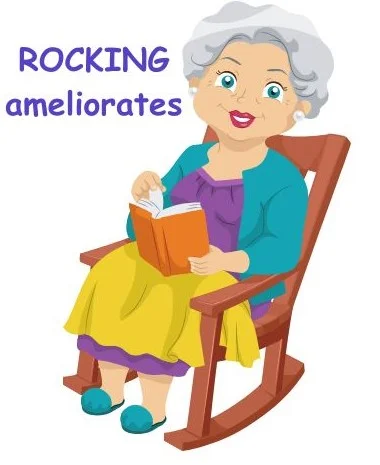
- “ROCKING” refers to the rhythmic motion of moving something back and forth, usually gently.
- It can involve swaying or shaking in a repetitive manner.
- “Ameliorates” means to improve or make something better.
- When someone says “ROCKING ameliorates,” they are suggesting that the rocking motion has a positive effect.
- It implies that the back-and-forth movement brings about improvement or relief in some way.
- This improvement could be in terms of soothing discomfort, reducing stress, or enhancing a situation.
Overall, “ROCKING ameliorates” conveys the concept that the gentle back-and-forth movement has a positive and improving effect, often in terms of comfort or well-being.
Remedies: Acon., cham., cina., puls., rhus-t.
ROLLING on the floor
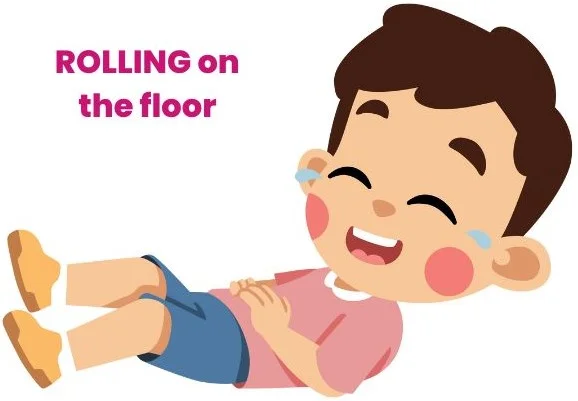
- “ROLLING” refers to the action of moving something, often in a circular or rotational manner.
- It involves turning or rotating around a central point.
- “On the floor” indicates that this rolling action is taking place on the ground or surface.
- When someone is “ROLLING on the floor,” it means they are moving their body in a rolling motion while lying down.
- This action could involve turning from side to side or in a circular pattern.
- People might do this for various reasons, such as playing, exercising, or expressing joy.
- “ROLLING on the floor” can also indicate laughter or a sense of humour, as if someone is laughing so much that they are rolling around.
- The phrase emphasizes the physical movement and the connection to the ground.
Overall, “ROLLING on the floor” describes the action of moving one’s body in a rolling motion while on the ground, often associated with playfulness, laughter, or physical activity.
Remedies: Calc., Op.
ROVING about naked

- “ROVING” refers to wandering or moving around aimlessly and without a fixed destination.
- It implies a sense of exploration or journeying from place to place.
- “About” indicates that the roaming or wandering is happening in various directions or locations.
- “Naked” describes being without clothing or covering, exposed to the elements.
- When someone is “ROVING about naked,” it means they are moving around without clothes, often outdoors or in different areas.
- This action might be intentional or accidental.
- It could signify a state of vulnerability or openness due to the lack of clothing.
- The phrase suggests a lack of inhibition or constraint, as the person is not clothed.
- “ROVING about naked” might also imply a carefree or spontaneous attitude.
Overall, “ROVING about naked” describes the act of wandering or moving around without clothes, indicating a sense of exploration, vulnerability, and possibly a carefree attitude.
Remedy: Hyos.
RUNS about

- “RUNS” refers to the act of moving quickly on foot, using legs to propel forward.
- It involves a combination of coordinated motions to cover distance swiftly.
- “About” indicates movement in various directions or within an area without a specific path.
- When someone “RUNS about,” it means they are engaging in rapid movement in different directions.
- This action could be purposeful, like playing games or completing tasks.
- “RUNS about” might also suggest a restless or energetic behaviour.
- It often indicates a dynamic and active approach to physical activity.
- This phrase might describe the movement of children at play or individuals completing chores.
- “RUNS about” can signify a lively and energetic disposition.
Overall, “RUNS about” describes the quick and varied movement in different directions, often portraying an active and dynamic behaviour.
Remedies: Hyos., Verat.
